The residents in our assisted living homes take a lot of medications. It’s pretty typical for older people who have a variety of chronic conditions. We always think of these medications as substances that are supposed to help us. But the drug-induced nutrient depletion that can result may cause more problems than the medications solve.
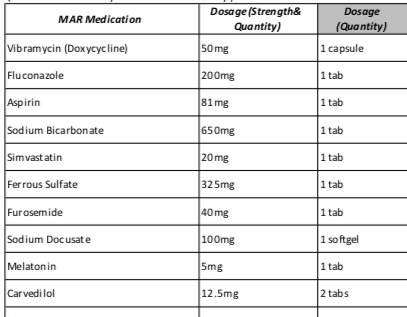
Medications are really important… For the condition they target.
On the other hand they may not be so good for rest of your body. Or other conditions you might have. They may even cause a condition you did not have before.
You’ve probably seen a few drug commercials. Particularly if you watch any programs popular with older generations. The FDA requires many of these drug companies to disclose the potential side effects from the drug. Some of those side effects can be quite scary. Here’s a little parody of the commercials:
A big reason why many of these drugs cause these side effects is because they deplete vital nutrients in your body. The lack of nutrients lead to other problems. Pretty soon you are back in the Doctor’s office. The Doctor gives you more drugs to fix the drug-induced nutrient depletion caused by the first drugs.
How Drug-Induced Nutrient Depletion Happens
There are several ways that Drug-Induced Nutrient Depletion happens:
- Certain drugs can suppress your appetite. Obviously if you don’t eat regularly, you are not receiving the kinds of nutrients your body needs
- Other drugs can increase your craving for nutrient-depleted foods, such as refined and processed carbohydrates. Processed foods and sugars will satisfy your cravings but won’t do a whole lot to bring nutrients into your body
- Internally certain medications can bind to the minerals in your gut before those minerals are absorbed into the bloodstream
- Some drugs can lower the acidity in your digestive system, which means your stomach acid becomes much less effective at breaking down your food. This problem is particularly big in the elderly, because we lose stomach acid naturally as we age
- Particular classes of drugs block nutrient levels in your cells. They can block certain enzymes or chemical receptors that aid in nutrient absorption.
- Drugs such as diuretics help flush fluids out of the body to take unnecessary waste. Along with all those fluids can go a whole lot of nutrients as well
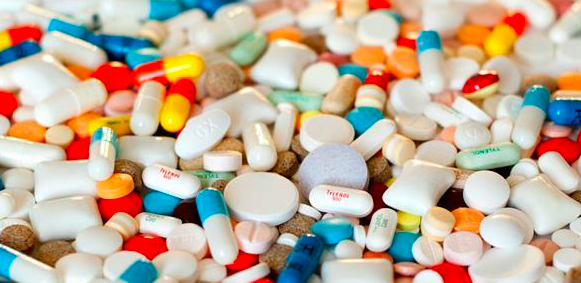
Common Drug-Induced Nutrient Depletion Problems
We see a lot of common drugs across many of our assisted living residents. Many of these drugs cause the drug-induced nutrient depletion that can lead to a host of other problems. Here are some of the most common, especially in the elderly:
Acid Blockers
These are mostly antacids, H2 blockers and Proton Pump Inhibitors. The way antacids work is to change the pH of the stomach to make it less acidic. This may help your heartburn or digestion short term. It doesn’t help the breakdown of your food with stomach acid. No food breakdown, no nutrient absorption.
H2 blockers and Proton Pump Inhibitors block histamines in your body which in turn blocks acid secretion. This is a particular problem in the absorption of Vitamin B12, especially in the elderly. It can also hurt the absorption of zinc, iron and folic acid.
Antibiotics
We see a ton of prescriptions in our assisted living homes. And we are not alone. According to the Centers for Disease Control (CDC), in 2015 there were 269 MILLION antibiotic prescriptions in the United States alone. Antibiotics can deplete all your B vitamins, along with Vitamin K, calcium, potassium, folic acid and magnesium. Some can cause drug-induced nutrient depletion of less well-known vitamins such as biotin and inositol.
Here is some more information about antibiotics and nutrient depletion:
Blood Pressure Medicine
The way blood pressure medicine works is by flushing fluid out of your body. Lower fluid, lower blood pressure. Along with the fluids go vitamins and nutrients. Many doctors will have you take potassium with the blood pressure medications to avoid that drug-induced nutrient depletion. Although these medications can also lower your levels of magnesium, sodium, pyridoxine, thiamine, ascorbic acid (Vitamin C) and zinc.
Cholesterol-Lowering Medications
Drugs that target cholesterol levels are generally called statins. Statins are some of the largest selling drugs on the planet. While it is a good idea to keep your cholesterol levels in check, there are definitely some side effects to statins. You can see another blog postwe wrote to find out about some of these side effects. Or read about the most widely-sold drug on the planet – the statin drug Lipitor.
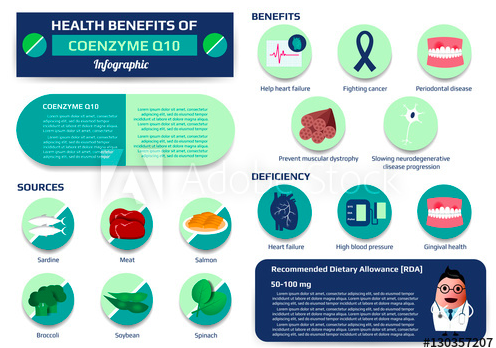
The biggest drug-induced nutrient depletion that occurs with statin drugs is Coenzyme Q10. Or more commonly known as CoQ10. A lack of CoQ10 can lead to:
- Irritabiility
- Moodiness
- Muscle issues (pain or failure)
- Impotence
- Depression
- Heart failure
Yup. That last one could be fatal. It’s also what you are trying to avoidwhen you take statin drugs in the first place! The other thing to think about is that the body needs some level of cholesterol to function. Artificially lowering your cholesterol through drug-induced nutrient depletion may cause more problems than it solves.
Bottom line: Talk to your Doctor, but if you’re on a statin drug, it would probably be a good idea to take a CoQ10 supplement as well.
Hormone Replacement Therapy (HRT)
After menopause, many women look to Hormone Replacement Therapy to help them regain the hormones they have lost with age. HRT can do some good things like slowing bone loss and therefore reduce the risk of falls and bone fractures.
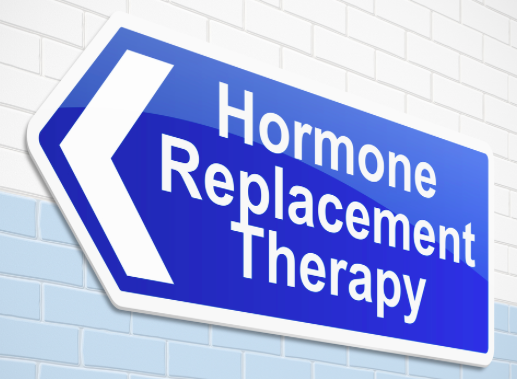
Of course, there are some problems with HRT as well. The same drugs that help restore hormones can also deplete vitamins B6 and B12, folic acid and magnesium. It would probably be a good idea to work with your Doctor to take some supplemental vitamins if you are using HRT.
There are lots of problems due to drug-induced nutrient depletion when you have a lot of medications. It’s tough to keep track of them all. We found this handy table from Pharmavite LLC that can help you look up some of the potential deficiencies.

Or you can use this..
Drug-Induced Nutrient Depletion Calculator

Dr. Jeffrey Gladd is an integrative medicine doctor in Indiana who was becoming frustrated about drug interactions as well. So he decided to do something about it.
In 2009 he created the website Mytavin to figure out which nutrients you are losing when you take certain drugs. All you do is enter the medications you are taking:
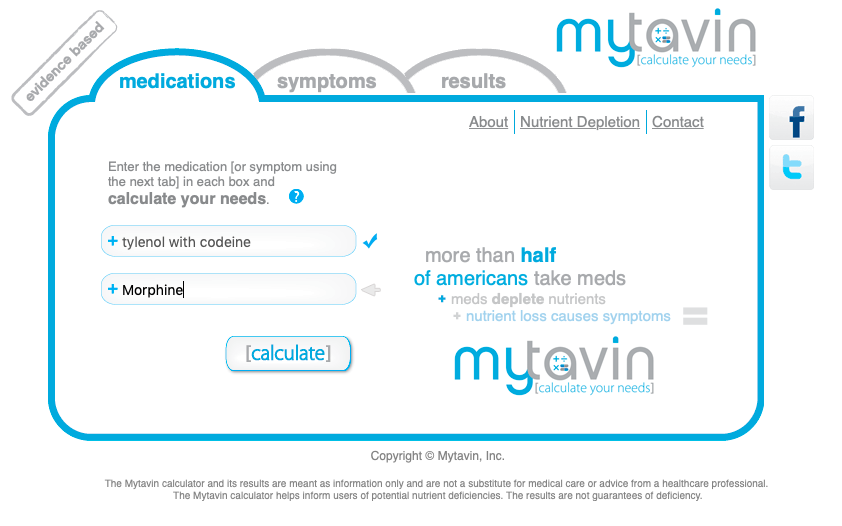
The calculator automatically shows you the nutrients you will probably be losing:
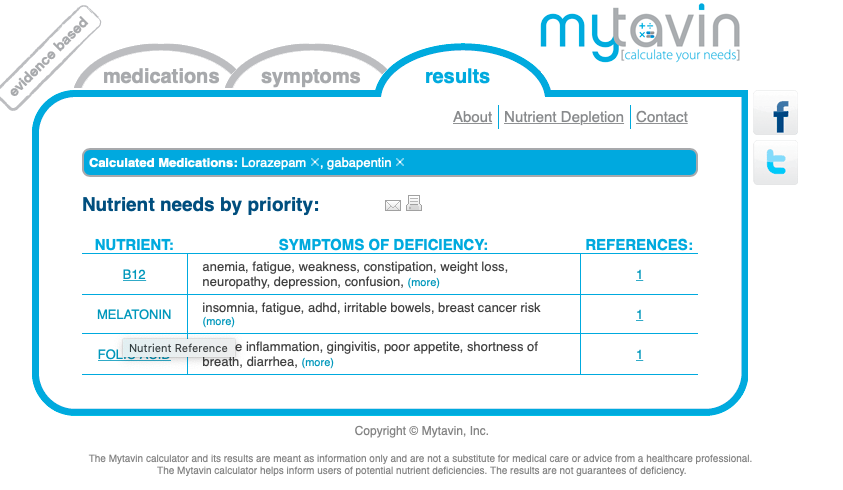
In addition, Mytavin lets you know some of the symptoms you might experience as a result of your drug-induced nutrient depletion. If you look just to the right of the symptoms, you will see a little number that has a hyperlink. Those numbers send you to a Pubmed article showing you the science behind the drug-induced nutrient depletion.
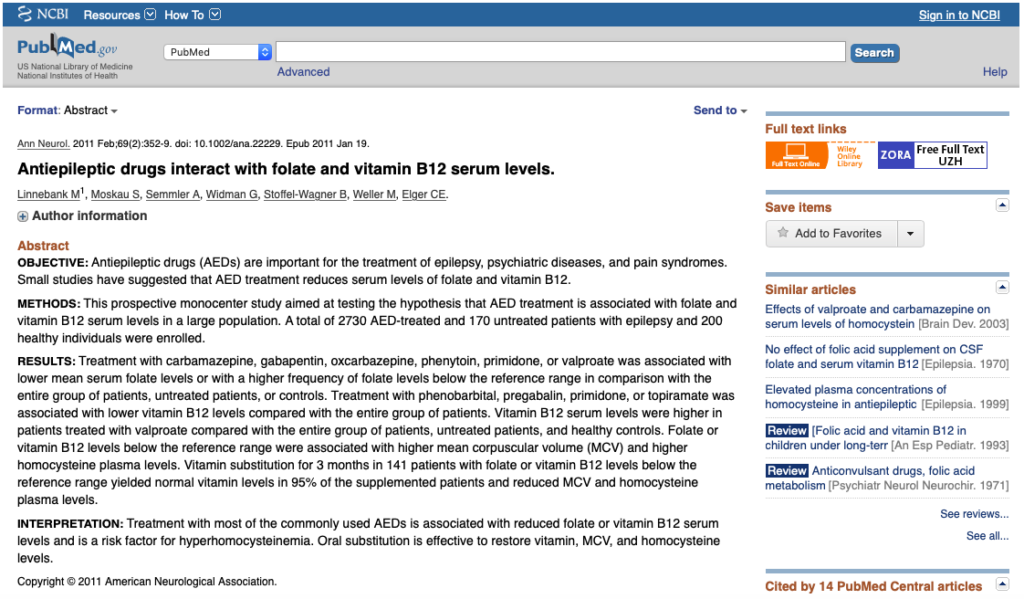
Pubmed is the official website of the National Institute of Health (NIH). It is a great database of tons of medical and health studies and research.
Hopefully that explains how to use Mytavin. If you have any questions, please contact us.
Our Approach to Drug-Induced Nutrient Depletion
We are big believers in good nutrition at A Paradise for Parents assisted living homes. The right food makes a huge difference in making sure your body has the right nutrients. That’s why we consult with a Naturopathic Doctor to design meals from scratch that help heal our residents.
If you would like to see what we do, please feel free to check out our website, email us, or call us at 623-295-9890.
No comments:
Post a Comment